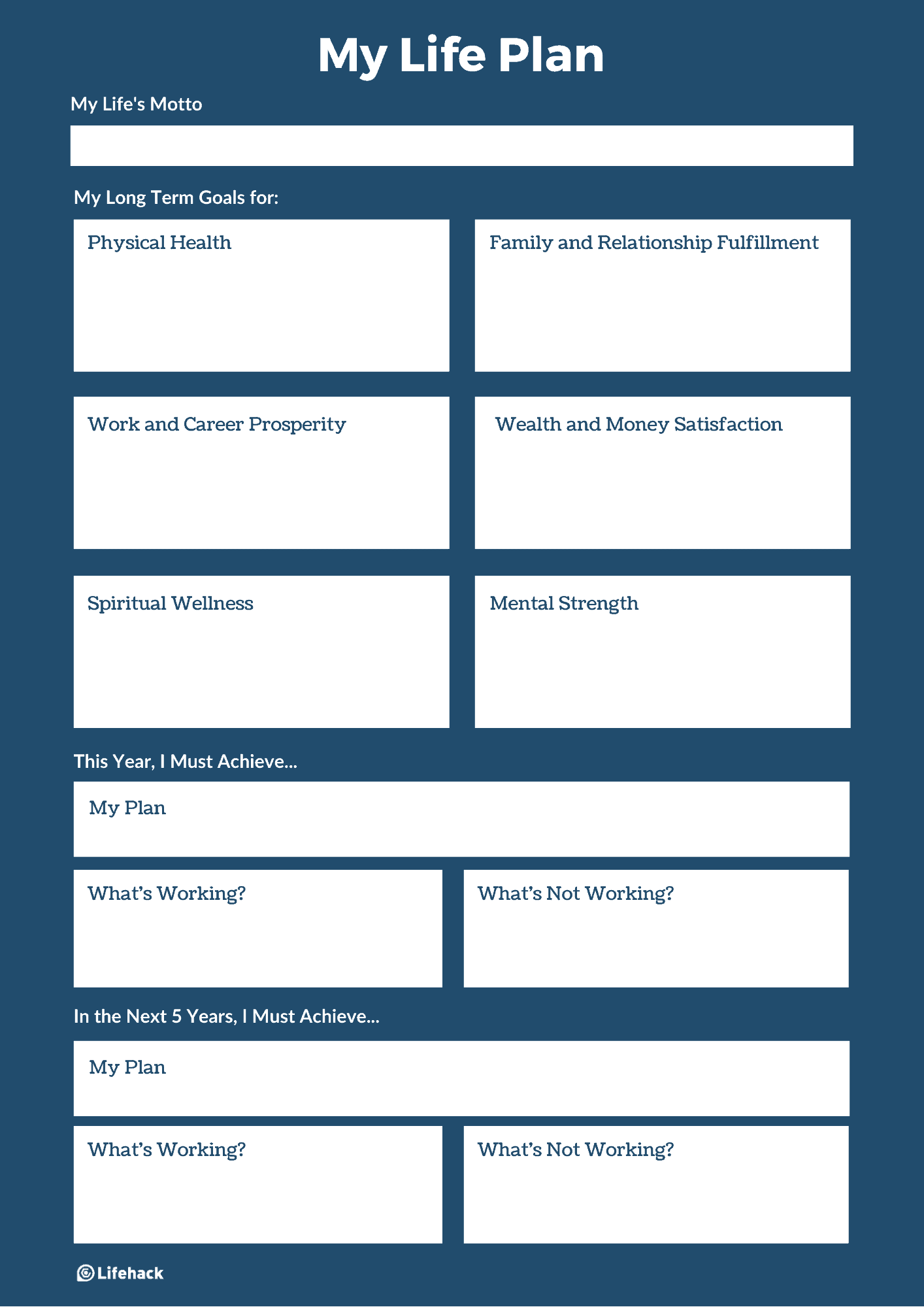Welcome to this blog about how to plan your life as a teenager in 2022!
If you don’t design your own life plan, chances are you’ll fall into someone else’s plan. And guess what they have planned for you? Not much.
Jim Rohn
Life is unpredictable and full of twists & turns, ups & downs, and a lot more. There will be bumps along the way that you don’t anticipate, turns where you didn’t expect to show up, and forks in the road that you didn’t foresee. That’s one of the many beauties of life – unpredictability. However, if not prepared for it, this unpredictability could turn into distress and difficulty.
This is where a life plan comes in. Creating a life plan will accommodate life’s unknowns so that you’re not unprepared. It will help you feel more in control of your life and provide a clear path towards your goals. “A life plan is a roadmap that helps you prioritize what is important to you, make decisions based on your priorities and move toward the life you want. In creating a life plan, you identify your values, what is important to you and what you want in your life. Then, when faced with decisions, you measure your options against your values and choose the option that best aligns with your priorities or that moves you forward on your chosen path.” (Indeed.com)
It’s important to understand that you’re not just making a rigid to-do list for yourself, you are creating an action plan that acknowledges that hurdles will be inevitable and allows room for growth and change, both internally and externally. A life plan will help you go from where you are right now to where you want to be in the future, and it’s a strategy to accomplish your goals and embrace change. Life planning helps you transition from dreaming about what you want in life to making it a reality. (tonyrobbins)
Below are 9 steps to help you create a life plan that works for you. However, before we get into that, learning how to create a life plan takes you beyond goal-setting; it adds an emotional element to your goals so you have meaning to achieve them. The process of creating a life plan will help you get to the core of who you are, what you want, and how to accomplish it. So, without further ado, here is how to create a life plan and transform your life:
1. Create a vision

The first step in your planning your life is to visualize yourself in the future as who you want to be. This helps because once you know your end goal, you will be able to create steps to get there. Allow yourself to dream big and imagine what a day in your ideal like looks like. Think about what you do throughout the day, what type of person you are, who you spend time with, what you work on, what skills you have, etc. Along with this, contemplate on what area of life you want to improve on, like finances, health, or more. And lastly, define what success means to you and how you can measure improvement. Don’t let anything stop you from visualizing your best self; the sky is the limit!
2. Evaluate yourself

To perform a thorough life assessment, you need to be honest with yourself and what you want. A life assessment includes considering factors like the roles you have in life, your satisfaction with different areas of your life and your various strengths and weaknesses. Reviewing your life from different perspectives allows you to develop a holistic evaluation. Practice self-reflection to clarify your roles and satisfaction in different areas of life. If you struggle with assessing your strengths and weaknesses, ask several people close to you who will give you an objective opinion.
Everyone fills different roles in life. Brainstorm a list of the different roles you play. Examples of roles include student, coworker, employee, manager, entrepreneur, volunteer, spouse, parent and sibling. In the next step, you’ll prioritize these roles and identify the values you want to bring to each one.
Consider different areas of your life such as career, finances, personal development, community, health, relationships and faith. Look at each area of your life and rank your satisfaction in that area on a scale of 1 to 10, with 1 being ‘needs a lot of work’ and 10 being ‘best’.
Identify your strengths and weaknesses. These can be either technical skills or soft skills. Understanding your strengths and weaknesses allows you to decide where to focus your energy—which weaknesses to improve or which strengths to highlight.
https://www.indeed.com/career-advice/career-development/how-to-make-a-life-plan
3. Identify your values

Your values are an important part of your life, as they guide you through each decision you make and make up who you are as a person. Comparing your life now and how you want your life to be will help you identify them, as both you right now and you in the future lives by these values. These values make up who you are even if you’re still working to realize them.
As said in the paragraph above, your values helps you make decisions and you can make them much more quickly because you can clearly see what options align and do not align with what you believe in.
4. Establish goals and deadlines

Now that you know where you are right now and where you want to be in the future, it’s time to set goals to help you reach your destination. Goals help you stay on track and give you the motivation to keep going and working hard. These could be things you want to accomplish over the course of several months or years. For each area of your life, think of a couple of goals you want to accomplish, and make sure that they are specific, measurable, attainable, realistic, and time-friendly!
The next thing to do is set deadlines for these goals. Oftentimes, we procrastinate on our goals because we don’t have the motivation to start now. However, by keeping a deadline, you’ll know when time is running out and you have to start. It’s totally okay if you don’t achieve a goal in the deadline that you give yourself, as long as you tried hard and did the best you could!
5. Eliminate roadblocks

As you plan steps forward, review your list of “what’s not working” and think about what’s holding you back from your goals, from experiencing less stress, from feeling that you’re where you want to be. Then make some cuts. Cut out commitments, relationships, and other aspects of your life that drain you and that aren’t absolutely necessary. Minimize what you can’t cut out. Look at every “drain” as a trade-off–do you want these things in your life, or do you want to be able to take steps toward the things that are really important to you? When you see these tangible choices, changes are easier.
https://www.verywellmind.com/how-to-make-a-life-plan-first-steps-3144639
6. Choose your priorities

Priorities help you understand where most of your energy and time should focus on. It’s hard to manage all aspects of life at once, so priorities help us choose what aspects mean the most to us so we can work on what matters to us. When creating a life plan, it can be tempting to every facet of your life, but that’s just overwhelming and not feasible. As a solution, choose your top 2-3 priorities to start with and you can add more when you’ve experienced success in the beginning. Some examples of priorities you may have are:
- School: Improving your grades & managing your time so you can complete homework and do more
- Health & Fitness: Eating healthier and doing more activities
- Mental Health: Mental health is always a priority and it is something you should constantly focus on.
7. Set up structures

It helps to create systems in your life to support what you want to improve on, so that you don’t have to supply all of your own momentum. For example, if you want to start working out more often, schedule 3-5 consistent days where you go to the gym. If you want to relieve stress, commit to a stress relief practice and add it to your morning or nightly routine. Setting up structures in your life helps you follow through on your goals and stay consistent so you can improve your life!
8. Stay accountable

You could have the best routines and habits in the world, but if you don’t stick to it and stay accountable, it’ll all go in vain. Accountability is a huge part of life, as it helps you understand where you are at and adjust so that you can get ahead. Some tips to staying accountable include:
- Having an accountability partner: Ask a friend or family member to help you stay accountable and keep sticking to your plans
- Measuring your progress: Take the time to see how much you’ve improved and how you’re doing. If you’re making progress, you’re on the right track.
- Making changes where necessary: If some part of your plan is not working, find out why and make effective changes
- Reward yourself: Self-improvement is no easy feat. It takes hard work, dedication, and patience. When you celebrate little successes, you’ll enjoy the process, and this will increase your chances of success.
9. Outline a plan

Last but not least, it’s time for you to outline a plan of the journey you’re going to take to reach your destination and achieve your goals. Come up with action plans and steps you need to take to work towards the life you dream of. Make sure that these steps align with your values and will help you move forward, not backward. If you need a resource, you can use and adjust the template above (created by Lifehack) to write down and review how you are going to make changes in your life and improve yourself!
The Takeaway
Plan out your life on paper, but live your heart by heart.
To elaborate on the quote above, it is helpful to plan out your life on paper and record your thoughts and ideas so that you can make it easily accessible and look at it for reference for whenever you need some guidance. By planning out your life and following the plan you made, the process of transforming your life will be much easier. Along with this, you will be less stressed and your chances at success will grow. Of course, there is no defined rule or strategy that everyone has to follow when planning out their life. The only thing you must follow is being true to yourself. But, to summarize, here are the 9 tips you should implement when creating your life plan. And remember, if you ever lose track, just refocus and try again!
- Create a vision
- Evaluate yourself
- Identify your values
- Establish goals and deadlines
- Eliminate roadblocks
- .Choose your priorities.
- Set up structures
- Stay accountable
- Outline a plan
I highly recomend reading the book, “Designing Your Life: How to Build a Well-Lived, Joyful Life” to help improve your life plan and add extra and important elements to it. Along with this, be sure to watch this TED talk on 5 steps to designing the life you want. Last but not least, check out my previous blog on how to live your life to the fullest as a teenager in 2021!
Ultimately, when it all comes to it, it is up to you to improve your life. You have to want it more than you are afraid of it, and you must be willing to work hard for it. Life is too short to just be thinking about what you want instead of actually working towards your aspirations. Yes, it is hard… but do it anyway. Start now by creating a life plan and organizing your life so you can work on your journey towards a better life and a better you. Good luck, and your time starts now!
